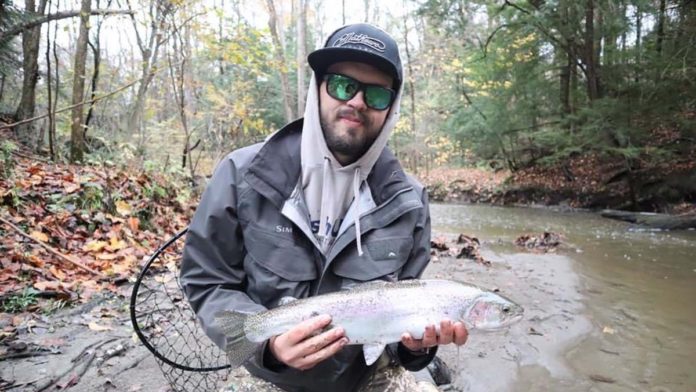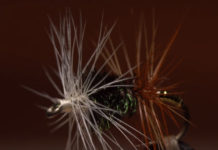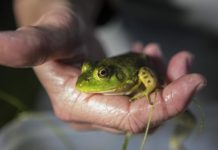Steelhead association works for angling opportunities
Sportsmen’s groups work to improve steelhead fishing around Lake Erie
Brian Whipkey, Erie Times-News
Steelhead fishing around the tributaries of Lake Erie can be incredible. The key is knowing what works and doesn’t for these unique fish in Pennsylvania.
The anticipation of hooking into a large 25-inch trout makes Erie an annual destination for many anglers across the commonwealth.
When the fish were young, they were stocked in the shallow creeks and then they swam into Lake Erie. Now they are following that mental imprint and scent of the stream to return to home during the spawning time of the year.
Behind the scenes: Angling associations work to improve Erie steelhead fishing opportunities
Kirk Rudzinski, owner East End Angler sport shop, Josh Feltenberger, FishUSA pro shop manager, and Dan Seaman, owner of Elk Creek Sports Store, recently shared their advice on how to fish during different water conditions and times of year.
Water levels
Low and clear: Clear water can be difficult fishing as the fish notice people walking around the waterways. “Their eyesight is incredible,” Rudzinski said. He added that steelhead can sense when people are walking along the creek.
Feltenberger said fishermen in low, clear water need to be stealthy by using longer fishing poles and not using bobbers.
He suggests using small minnows and flies such as woolly buggers in natural colors. He said white, olive, black, brown and tan are good choices this time of year.
Rising water: Rudzinski suggests night crawlers or red worms in these conditions. He said the San Juan worm that looks like a small red worm with a hook in the middle works well, and some fly patterns that have been effective are nymphs and woolly buggers.
Both men said, for live bait, emerald shiner minnows are a good choice. Steelhead that have been living in 70 feet of water or more are used to seeing emerald shiners and will take them on their way to the shallow creek waters. Feltenberger said to keep in mind steelhead can smell and will be attracted to the minnows. Rudzinski advises anglers to hook the bait fish through the top lip to allow the minnow to still be able to swim.
Feltenberger feels streamers sometimes work better than nymphs, but anglers have been catching fish with nymphs, too. Single salmon eggs have been working as well.
Creating access for all: Uniquely-designed boat makes fishing on Lake Erie possible for anglers with disabilities
High water: Rudzinski said when the creeks are high, it’s difficult to fish. “Our creek bottoms are shale and become violent.” He said heavy rains will make the streams cloudy, dirty and turbulent – like water coming out of a pipe.
He said during high water you don’t want to wade as you can’t see where you are stepping in the murky, fast moving water. During high water you should fish near the edges in little eddies of slow moving water.
Regulation could change: Lake Erie creel limit might be reduced for lake trout
Lake Erie: Fish often stage at the mouths of the Lake Erie tributaries waiting to swim up stream. Rudzinski said some of the popular lures to use are spoons like Kastmaster, Cleo, Pheobe and KO Wobbler. Preferred color choices are blue and chrome, and green and chrome that emulate the shiners swimming in the region.
Size spoon sizes range from 1/12 of an ounce up to 1/2 ounce. He said the deeper the water, the larger the spoon. “If you choose the 1/2 ounce, you will be donating it to the creek pretty quick,” he said about trying a larger, heavier spoon in shallow water. “If I’m casting into a creek, I’m down to the 1/12 ounce,” he said.
Feltenberger offers some similar options. For fish that are staging in front of the creeks, anglers are using Rooster Tail spinners, spoons and small crank baits where the fish are still holding in the lake.
Bait
Single salmon eggs: Feltenberger said to use a small size 16 to 20 hook with a single egg. Rudzinski feels single egg patterns will work about all year in a variety of colors such as pink, white, orange, yellow and green.
Rudzinski said egg sacks are effective, too. Sport shops have Chinook eggs that are placed in small mesh that are placed on your hook.
Waxworms, grubs and maggots: Live bait can be fished at varying depths with the use of a bobber in slow moving waters. Rudzinski said for the purist, “it’s a strike indicator,” he said about bobbers. When fishing rapids, you don’t use a bobber, just a couple split shots to hold your line down.
Seaman, who has owned his sports store for 43 years, said the early season baits are spoons and spinners and also crank-bait because fish will chase them in warmer waters. Also popular are PowerBait dough bait, minnows and maggots, tipping jigs. As the waters cool down later in the season, Seaman said the PowerBait does not work as well and the spoons slow down also. Minnows and nightcrawlers become popular and jigs continue to work.
Artificial flies Both Rudzinski and Feltenberger said artificial flies, streamers and nymphs work well.
Rudzinski mentioned several colorful names of flies that are available including Scrambled eggs, which are a fluffy egg shape in different colors, Crystal Meth, which is a sparkling fly with strings trimmed around it, and sucker spawn, which has loops in it.
Fishing pole option
Noodle rods: With water being clear, it’s helpful to use as thin a line as possible. To make that happen, there are noodle rods that are much longer than typical spinning rods. The long, 9- to-12-foot noodle rods absorb some of the fight that is normally only placed on the fishing line. The rod can act like a shock absorber, allowing anglers to use 4- or 6-pound test line to reel-in heavy steelhead.
Rudzinski said fishermen with standard spinning rods are using 10-pound test lines and sometimes the fish can see the line and won’t bite. With a noodle rod, Rudzinski starts out with 6-pound test line and if doesn’t work well, he goes to a thinner 4-pound line.
Big fish: 53-inch musky among the biggest fish caught in Pennsylvania
For gear, Feltenberger also suggests noodle rods with a 10-pound test line. He said you need to add a leader about 18 to 24 inches long of 4- or 6-pound line near your bait. The thinner line is less detectable to the fish.
Mistakes and misconceptions
Feltenberger shares a few of the misconceptions/mistakes steelhead anglers make.
Wading: One of the biggest misconceptions he said is that anglers feel the need to wade. The fish are sensitive to the surroundings, and wading can move the fish away from you or make them uninterested in your lure. “The fish don’t get as much credit as they deserve,” he said about their wariness.
Dress properly: “Lake Erie is notorious for the weather changing. Sometimes you can experience all four seasons in one day,” Feltenberger said about having layers of clothing available to suit the weather conditions.
Right size of gear: Another misconception new steelhead fishermen believe is that you need heavy tackle. Feltenberger said you don’t need 12-pound line at your hook to reel in steelhead, but you also don’t want to show up with an ultralight fishing set-up either.
Not trying something different: “Try switching it up,” he said about sticking with a bait or presentation too long. Just because something worked two years ago, doesn’t mean it’s the fly or bait to use this season.
Not doing your homework: Anglers have plenty of resources online. He said go to YouTube and other sources to learn about this special style of fishing in Pennsylvania. “We have the internet to find anything and do anything.”
Leaf watchers: DCNR maps to show changes to foliage across Pennsylvania this fall
Another resource: If you are planning a trip to Erie, you can monitor the lake and Trout Run conditions by going to the FishUSA.com website. They have a live video camera where the creek flows into Lake Erie on Avon Beach. (The creek is classified as a nursery water and cannot be fished.) You can see if there are waves on the lake and how plentiful the fishermen are on those days. “It shows you what it’s like,” he said. The shop partnered with Fairview Township, Sons of Lake Erie and the PA Steelhead Association on the live cam project.
Shop local and learn: He said anglers need to stop in the local sporting good stores and talk to the people. “We’ll tell you what’s going on. Stop in and talk to us.”
Feltenberger likes fishing and “It gives me joy to see people catching their first steelhead.
Brian Whipkey is the outdoor columnist for USA Today Network sites in Pennsylvania. Contact him at bwhipkey@gannett.com and sign up for our weekly Outdoors Newsletter email on your website’s homepage under your login name.
Exploring PA With You as Your Outdoors Concierge!
My goal is to help others better understand what’s available in Pennsylvania and to explain what’s happening with state agencies regarding fishing, hunting and enjoying the outdoors. I’ll answer common questions that you may have regarding hunting, fishing, camping, visiting the state parks and trails and almost anything else that you can do outdoors. Twitter: @whipkeyoutdoors / Instagram: whipkeyoutdoors
Credit: Source link































